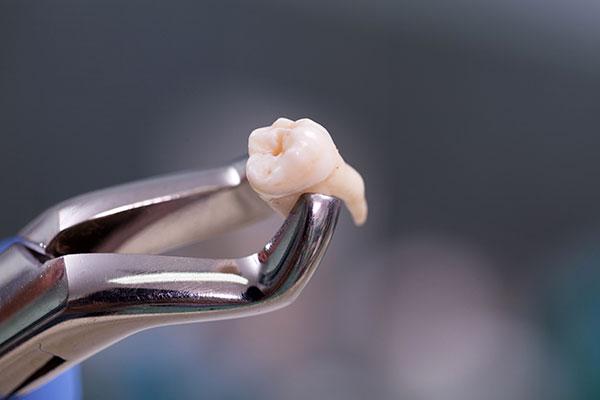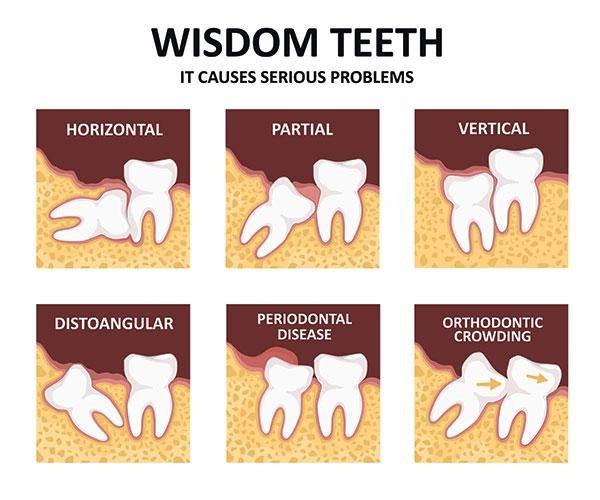One of the most common minor surgeries performed by oral and maxillofacial surgeons in Phoenix, AZ, is wisdom tooth removal. This blog will discuss everything you need to know about wisdom teeth and their removal.
 Signs and Symptoms you need a wisdom teeth removal
Signs and Symptoms you need a wisdom teeth removal
Wisdom teeth also known as third molars have the tendency to erupt at unusual angles. At times, wisdom teeth may not erupt at all and become embedded in the jawbone. The reasons behind this are varied, and the most common is lack of space. A smaller jaw cannot house a third molar properly, which leads to its unusual erupting angles or lack of eruption.
A wisdom tooth is now considered a vestigial tooth and is removed when it starts showing signs and symptoms of the disease. The most common signs and symptoms of a wisdom tooth problem that may require its removal are:
-
The wisdom tooth has not erupted normally.
-
It has become embedded in the bone.
-
Pain which can be localised in the area of wisdom teeth or it may also extend in front of the ear and the neck.
-
Jaw pain.
-
Difficulty in mouth opening.
-
Red or swollen gums.
-
Tender and bleeding gums around the wisdom tooth.
-
Infection involving the wisdom teeth and surrounding gums.
-
Dental decay.
-
Bad breath and unpleasant taste in the mouth.
* If you are experiencing any of the above mentioned symptoms, it is time to consult our board-certified oral and maxillofacial surgeons at Phoenix Oral and Facial Surgery.
What is the most common treatment for wisdom teeth?
 The most common treatment for a wisdom tooth that is causing pain or is affected by any other oral pathology is its removal. Wisdom teeth can be removed through simple or surgical methods. The method of removing your wisdom tooth will depend upon the level of its eruption, angle, and amount of bone covering the teeth.
The most common treatment for a wisdom tooth that is causing pain or is affected by any other oral pathology is its removal. Wisdom teeth can be removed through simple or surgical methods. The method of removing your wisdom tooth will depend upon the level of its eruption, angle, and amount of bone covering the teeth.
A simple extraction is carried out when the tooth is completely visible and erupted in the oral cavity. Extraction forceps and elevators are used to loosen and remove the teeth. The procedure is carried out under local anesthesia, which ensures a pain-free and comfortable procedure.
Surgical removal of the wisdom tooth is carried out when the tooth is covered by gums and is embedded in the jawbone. After proper sedation and local anesthesia, a surgical incision is made on the gums over the wisdom tooth. The gum tissues are reflected, and the underlying wisdom tooth is exposed. At times, a substantial amount of bone may be covering the tooth, which makes removal difficult. In these cases, the bone is removed with the help of specialized drills and instruments. Sometimes, the tooth must be sectioned in multiple pieces to ensure its safe removal without injury to adjacent structures. Once the tooth is removed, the gums are stitched back and allowed to heal. In a matter of weeks, the empty socket will heal, and new bone will be formed in the space left behind.
The benefits of wisdom teeth extraction
Evolutionary studies suggest that wisdom teeth will soon become obsolete. There are many benefits timely removal of wisdom can offer. These include:
-
Prevention of dental decay and infections.
-
When an embedded wisdom tooth tries to emerge, they exert inadvertent forces on the remaining teeth, thereby causing harm to the teeth in front, namely, the second molar. Timely removal of wisdom teeth will prevent damage to remaining teeth.
-
Eliminates facial and jaw pain.
-
Embedded wisdom teeth can also cause crowding, leading to a bad bite and invasive orthodontic procedures in the future. Removing wisdom teeth early will prevent the need for orthodontic work in the future.
-
Wisdom teeth are also notorious for getting involved in oral pathologies like a cyst or a tumor. Early removal will ensure proper treatment and prevent such incidents.
-
Improve oral and overall health.
Complications that impacted wisdom teeth can cause
 Impacted wisdom teeth can lead to a bad bite and future orthodontic problems such as crowding. It can also predispose an individual to teeth grinding and jaw clenching owing to a bad bite. This further makes them susceptible to jaw-joint (temporomandibular) disorders.
Impacted wisdom teeth can lead to a bad bite and future orthodontic problems such as crowding. It can also predispose an individual to teeth grinding and jaw clenching owing to a bad bite. This further makes them susceptible to jaw-joint (temporomandibular) disorders.
Wisdom teeth, especially the ones which are partially embedded, are difficult to keep clean. These often become a haven for disease-causing bacteria. Bacteria will erode the teeth and lead to the formation of dental decay, which can further progress to become an abscess leading to facial swellings. The bacteria from this infectious focus can enter the bloodstream and infect other organs.
Wisdom teeth are often associated with cysts and tumors. These are often slow growing and become evident to the patient only when they have reached a significant size. Early treatment for impacted wisdom teeth will also allow you to get an early hold of such ailments and get them treatment before they advance to more severe stages.
When do you have to visit an oral surgeon immediately for wisdom teeth?
Wisdom teeth removal can be done electively and is planned. However, there are some instances where wisdom tooth removal has to be performed immediately. These are emergencies and must be dealt with swiftly to avoid further complications.
Extreme pain, visibly growing swelling, discharge from the site, inability to open the mouth, and difficulty in swallowing, are some of the most common symptoms of a wisdom tooth emergency. In such cases, we urge you to schedule an emergency appointment with us at Phoenix Oral and Facial Surgery.
The thought of having your wisdom tooth removed can be intimidating. We understand the apprehension which can come with oral surgeries; therefore, we motivate our patients to talk to us regarding any concerns they may have. We use state-of-the-art and pain-free techniques to ensure you are calm and comfortable during your treatment at office Phoenix Oral and Facial Surgery. If you have any more questions or wish to schedule an appointment, please reach out to us. Our team of excellent healthcare professionals and surgeons is here to assist you and your family with excellent oral and overall health.

